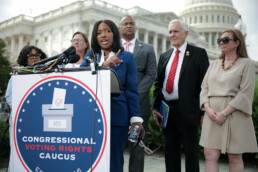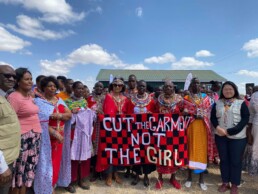The FDA...Did Good?
 November 11, 2025 Greetings, Meteor readers, It’s 11/11, make a wish.  In today’s newsletter, we’re feeling optimistic about menopause. Plus, a stunning upset in Kansas City. 🥶🥶🥶🌷, The Meteor team  WHAT'S GOING ONWhat’s the HRTea?: Yesterday, Martin Makary, the FDA commissioner, announced that hormone therapies for menopause will no longer be required to carry the black box warning they’ve borne for nearly two decades. It was a difficult moment to process, mainly because it’s almost impossible to believe that a government agency overseen by a man so opposed to science actually appears to be…following the science. And for the benefit of women!? Let’s be clear: There were some fruit loops mixed in with the rational research presented by the FDA yesterday. In a breakdown of the event, reporters at Mother Jones highlighted some of the more dangerous claims, like the suggestion that untreated menopause symptoms lead to divorce (they do not) and that menopause kills women (also nope).  ACTRESS HALL BERRY, LAST YEAR, DURING A BIPARTISAN EFFORT TO INCREASE FEDERAL RESEARCH ON MENOPAUSE (VIA GETTY IMAGES) Makary and Co,’s antics aside, though, “this announcement was a step in the right direction,” says Claire Gill, founder of the National Menopause Foundation. “Removing the black box warning from low-dose vaginal estrogen products is a positive step toward improving women’s midlife health and beyond. And it’s something leading menopause experts and advocates have been trying to get corrected on labeling for more than 20 years.” If you’ve never seen one before, a black box warning (which is the highest form of warning the FDA can issue about prescription medication) lists the most severe risk factors in taking a drug. In addition to drugs used in hormone replacement therapies (HRT), the FDA has placed black box warnings on some antidepressants, opioids, and NSAIDs. In the case of HRT, the FDA issued its warnings—citing risk factors like heart attack, stroke, and breast cancer—following an initial women’s health study that began in 1991. But ”the risk and/or effectiveness of HRT was not something originally in the scope of the study,” Gill explains. When researchers at the time observed the data, there was a slight increase in breast cancer among women in the study who were on HRT versus those who were not. “What we now know,” Gill says, referencing an updated report from JAMA, “is that the women in that study at that time had initiated hormone therapy more than 10 years after they reached menopause. When the data was reviewed to determine the risk for women who started on HRT closer to the onset of menopause, it was shown that there was actually no additional risk for any of those conditions and, in fact, there were some very positive benefits [to taking HRT], in breast cancer risk reduction and osteoporosis prevention, among other things.” And as research since then has shown, HRT—while not a miracle drug, and not recommended for all women—can be an immense help in improving quality of life, reducing certain menopausal symptoms like vaginal dryness, pain during sex, and incontinence. And “an important next step,” Gill adds, “would be to convene medical societies whose members…treat women at midlife and beyond—gynecologists, internal medicine, family medicine, urologists, sexual medicine, geriatricians, etc.—and have a robust discussion to come to consensus on what all of them agree on when it comes to HRT and estrogen therapy. That would provide enormous benefit to advancing menopause care in the U.S.” AND:
 YOUR FAVORITE MUSIC GROUP'S FAVORITE MUSIC GROUP (VIA GETTY IMAGES)
 THE REASON PEOPLE STILL BELIEVE IN YOUNG LOVE. (VIA GETTY IMAGES)  FOLLOW THE METEOR Thank you for reading The Meteor! Got this from a friend?
|
![]()
Head Start is at Risk
 October 30, 2025 Happy Halloween eve, Meteor ghouls, Anyone sporting any super cool costumes this weekend? I’m dressing in the same one I wore last year: exhausted mom whose sanity relies entirely on very long showers. Or maybe I’ll join the fray and dress up as Rumi.  I KNOW YOU DIDN'T THINK I WOULD DRESS UP AS STAGE RUMI. SWEATPANT RUMI FOR THE WIN. In today’s newsletter, we take a look at the larger implications of losing access to Head Start. Plus, three questions about embracing your inner crone. Goin up, Shannon Melero  WHAT'S GOING ONA much bigger picture: At the end of this week, more than 100 Head Start centers in the U.S. and Puerto Rico will not receive their funding due to the government shutdown and may have to close their doors. That could leave 58,000 children without the early education programming and meals provided by Head Start centers. In some states, closures have already begun, and communities are scrambling to fill in the childcare gap left behind. On the surface, all of this may seem like an unfortunate but temporary side effect of the shutdown—a harm that can be undone once we flip a switch and turn the government back on. But what does it look like when you zoom out ever so slightly? It looks like the slow but successful execution of Project 2025. In its entirety, we know that Project 2025, released in April 2023, is a manifesto against the poor, immigrants, and anyone else who is not a white, Christian, heterosexual, cisgendered male. Some lowlights include: reversing FDA approval of mifepristone, ending DEI programs, and eliminating the Department of Education. And, relevant to this week’s news, ending Head Start. Project 2025 claims the Head Start program has “little or no long-term academic value for children,” which is why Roger Severino (who authored this section of Project 2025) lists “Eliminate Head Start” as part of the “conservative promise.” The current shutdown is proving effective in delivering on that promise. If I’m starting to sound like a gal who wears a tin foil hat in her spare time, just take a look at the facts. The National Women’s Law Center identified targeted attacks on Head Start from the administration beginning in January and continuing every month. Another tenet of P25 and this administration is to create a scenario where more parents are staying home to raise their own children or leaving their children with relatives. In the conservative worldview, day care is for parents who simply don’t want to parent, which would make Head Start—which has been around since 1965—a key part of the problem, funded by tax dollars. It’s all connected. But the attacks on Head Start are helping to create a Grand Canyon-sized fissure between the wealthy and the working class by playing up the narrative that those with means shouldn’t be responsible for caring for those without. Conservatives have repeatedly called federal safety programs for the poor a misuse of taxpayer dollars, and Head Start and free early childhood education programs, often described as handouts by right-leaning pundits, fit perfectly into the false narrative of wealthy taxpayers being burdened by the needs of medium-to-low earners. If the cuts to federal safety programs continue, they may also serve another purpose: removing the poor from the political process. People often don’t get involved in politics when they’re spending their time hustling just to get food on the table. So it’s not just that SNAP isn’t being funded next month. It’s not just some Head Starts preparing to close. It’s not just funding shortages for WIC, the program that helps moms feed their kids. It’s all that and the increased militarized police presence in lower-income neighborhoods. It’s all that and kidnapping people of color off the streets and disappearing them into the system. It’s what Project 2025 called for. The government shutdown is simply delivering. AND:
 WHERE YOU BEEN GIRL? (VIA GETTY IMAGES)
 WEEKEND PLANS Three Questions About...Embracing Your Crone EraIt's a thing, says Nina BargielBY BRIJANA PROOKER COURTESY OF PENGUIN RANDOM HOUSE In the age of Ozempic and deep plane facelifts, in which every outward sign of aging is reversible as long as you have the luxury of money, author Nina Bargiel has a revolutionary idea: Embrace your crone era. It’s a spooky concept, particularly post-2020, when staring at our faces over Zoom prompted a plastic surgery boom, pushing us past body positivity and even body neutrality, all the way into mainstream body hate. But it’s Halloween, the perfect time to honor our wisdom and warts. In THE CRONE ZONE: How To Get Older With Style, Nerve and a Little Bit of Magic, children’s TV writer Bargiel, 53 (who famously wrote the bra episode of Lizzie McGuire), uses the triple goddess concept to answer a key question: what's a crone (AKA any woman over 35, according to my Instagram feed) to do? “Fuck it,” Bargiel writes. You’re a self-declared crone in your 50s. How would you describe “crone” for the modern era? So Baba Yaga has always been my bitch. Baba Yaga is the [Slavic] crone who has self-selected herself into the woods. She lives in a hut atop chicken legs. She has a terrifying fence made of human bones. When a traveler gets lost and knocks on her door, sometimes Baba Yaga eats them. And my thought is, this woman has given every indication she does not want to be bothered. So if you’re knocking on her door, and she ends up frying up your liver, you kind of deserve it, because she has made it very clear: leave her alone. For me, a crone is a woman who is sick and tired of making herself small to make other people feel comfortable. I refer to it as when your inner “fuck you” becomes your outer “fuck you.” In your book, you say, “Whether gracious grandmother or wicked witch, the crone is always cast as a woman whose best days are behind her.” What are we getting wrong about how we understand crones? The crone is overlooked and looked down upon, yet the crone is filled with magic. It’s funny because society [says] you're invisible and you're useless. But [crones also] have wisdom and power. If you think about Shakespeare and Macbeth and the three witches, I mean, they're terrifying. Like, they are hags, but they will mess you up. And I will say, [the definition of] “older women” keeps getting younger by the day. I was talking to a woman at one of my [book] signings…about my crone book, and she was like, “I need this because people are treating me this way.” She's 28 years old. I love your crone touchstones: “Wisdom, to know who we are, Knowledge, to understand what we want, and Fuck It, to do what we please.” What does “Fuck It” mean to you? [As a woman in a male-dominated writer’s room], you’ve got to be nice, you’ve got to get along. I played that [role] for a long time, and I discovered that it didn't get me any further. I would bite my tongue, and then these men wouldn't hire me again anyway. So why was I biting my tongue? I might as well just be 100% who I am. When COVID hit, and I had a divorce, and the entertainment industry was taking a bad hit, I just got sick of pretending everything was fine all the time. I sold my house [in Los Angeles] and moved in with my parents [in Illinois] and got a job working in the cheese department at Whole Foods. And there are people who are like, “You shouldn't say that because people won't take you seriously as a writer.” If people don’t take me seriously as a writer, after 25 years, after two Emmy nominations, after two Kids’ Choice Awards and a Gracie Allen Award, they were never going to take me seriously. So my Fuck It is, if you look at me as lesser because I'm part of the labor force, then I feel sorry for you, because life's gonna hit you hard. Another part of Fuck It is I am 53, and my boyfriend just turned 35, so he is 18 years younger than I am, and fuck it, I don't care. There are a lot of people that have said a lot of things, and by the way, they're mostly men. Almost every woman, when they find out, are like, “Oh, good for you, sister.” If someone's gonna try to shame me for that, fuck it. Women cannot build a hut atop chicken legs or have a fence made of human bones [like Baba Yaga]. But we can wear headphones. We can have all of these things that say, “Do not bother me,” and yet the travelers, who are usually men, still come knocking at our doors. Unfortunately, we cannot fry up their livers, but we do not have to entertain whatever it is they have to say.  Brijana Prooker is a Los Angeles-based freelance journalist and essayist covering health, gender, and culture. She's a proud pit bull and cat mama whose work has appeared in ELLE, Washington Post, Good Housekeeping, and Newsday.  FOLLOW THE METEOR Thank you for reading The Meteor! Got this from a friend?
|
![]()
Forty Million Empty Stomachs
 October 28, 2025 Greetings, Meteor readers, I voted yesterday. When are you going? Soon? Yeah? Great! May your sticker be extra adhesive. In today’s newsletter, we look at the looming SNAP cuts. Plus, Irin Carmon tells Rebecca Carroll about her new book, Unbearable: Five Women and the Perils of Pregnancy in America. Hotties vote early, Shannon Melero  WHAT'S GOING ONThe SNAP gap: This week, roughly 40 million people will not receive their scheduled November funds from the Supplemental Nutrition Assistance Program (SNAP). Which means forty million people will spend most, if not all of November, struggling to feed themselves. As the government shutdown approaches the one-month mark, officials seem no closer to a solution and are instead pointing fingers over who is to blame for not distributing the billions of dollars of contingency funding that could alleviate the problem. In the meantime, those in need are left with limited options. “Cutting a federal safety net and telling people to go to a charity is not a solution, it’s a drop in the bucket,” says Greg Silverman, executive director of New York’s West Side Campaign Against Hunger. Silverman, who has worked in the food insecurity space across the world, is frustrated. “We can’t make up the gap on SNAP,” he says. “We’re not gonna volunteer our way out of this.” He explains that in his city alone, one in ten people deals with food insecurity, and in the weeks since the government shut down, emergency distribution groups have already had to step up their efforts to keep communities fed. “We’ve been adding more micro distribution points in neighborhoods where we have the highest number of folks we serve. We do that to get food closer to people so it’s cheaper for them, they save time and money on transport, and they also feel safer getting food closer to home.” While this is a boon to recipients, Silverman knows it’s not enough. Here’s what would be better: “ We need our national elected officials to have the USDA use the funds that are already allocated,” he says. “It exists, the money is there. They don’t need to open up the government to do this; they need to just send that money out to the states to be able to distribute food to people in need.” (If you are looking for ways to pressure your elected officials to act, the Food Research and Action Center has a number of options and step-by-step instructions.) In New York, this has already happened. Yesterday, Governor Kathy Hochul announced the state would be fast-tracking $30 million in emergency food aid for SNAP recipients. “Those weren't additional funds,” Silverman, who was at the press conference when it was announced, explains. “Those were previously allocated funds that [are] being fast-tracked to get out into the community faster.” Across the country, states are also suing the administration for failing to keep food benefits active. These efforts are good and necessary, but they are likely to move slowly through the court system, and won’t put dinner on the table this weekend. So what can the average person do today? “Frontline organizations need dollars right now because they’re out here having to buy more and more food,” Silverman says. In other words: We may not be able to volunteer our way out of this mess, but we can volunteer through. “Everyone can volunteer, whether it's once a year, once a quarter, once a month, once a week. If you have the funds, give them directly to organizations in need. If you have the time, give that.” If you have been impacted in any way by the government shutdown, please visit findhelp.org for resources in your area. If you can donate time or money, please choose a food pantry local to you. AND:
 The Complex Landscape of Pregnancy in AmericaA new book dives into what the experience is like—and whyBY REBECCA CARROLL  (COURTESY OF SIMON AND SCHUSTER, AUTHOR PHOTO BY SOPHIE SAHARA) If you’ve ever been pregnant (to term or not), you know that suddenly your choices are of public interest, and sometimes outright judgment. Pregnancy is a deeply personal experience that also inescapably involves power, vulnerability, politics, and a litany of unjust systems built for only certain beneficiaries. In her latest book, Unbearable: Five Women and the Perils of Pregnancy in America, journalist Irin Carmon weaves together narrative stories and reporting to create a lucid, sometimes heartbreaking, chronicle of how pregnant people are guided, or too often misguided, to navigate the experience in America. Rebecca Carroll: I want to start by asking about something you wrote in the book’s introduction, which is that “being pregnant in America means bearing the consequences of separating one form of reproductive care, abortion, from everything else.” What is “everything else,” and what do you mean? Irin Carmon: All other forms of reproductive medicine—prenatal care, birth, infertility, pregnancy loss—or even gynecological care in general. Before the white male takeover of medicine in the United States and Europe [in the mid-19th century], all reproductive care [including abortion] was more integrated into communal life, really across cultures. It was a group of women who were surrounding somebody at different stages of their reproductive life, from the onset of menarche through pregnancy and childbearing. I’m not saying that that system was perfect or that the old way was the right way, but I was really struck reading the history of the first abortion bans—as we live under the yoke of the new abortion bans, which are even more Draconian and enforced with much more efficacy—that abortion bans and the white male medical establishment takeover of medicine were inextricably linked to each other. It struck me as one of the many original sins of [modern] medical care. The other one being that the foundation of contemporary gynecology and obstetrics was American enslavement, and the unjust experimentation on enslaved women. The part about experimenting on enslaved Black women was really hard to read—I actually physically winced. I think the narrative around childbearing and rearing for Black women in America is so fraught, from the brutal, harrowing reality of how it all started with enslaved Black women, to the way that Toni Morrison used to talk about mothering as this gift of being able to keep and mother our children. How did you reconcile the different ways that Black women and white women experience pregnancy care? Dr. Yashica Robinson [an Alabama-based OBGYN and former abortion care provider] was actually one of the starting points for me wanting to write this book. In so many ways, the work that she does is the embodiment of what could be a better way. I first met her in 2014 when I was reporting for MSNBC, and I had come to interview [her husband], who ran the only Black-owned clinic in Alabama. Dr. Robinson walked into the room, and when she started talking, I thought, “Who is this? Did I come to interview the wrong person?” I thought, this is the person who I want to learn from, and to help me understand the truly bifurcated, painful dichotomy you are talking about. Another Black woman I write about in the book, Christine Fields, died in the same hospital as Maggie Boyd, a white woman I also write about. They were both harmed by the same doctor. But…Maggie was able to come home and raise her son because when her husband screamed for help, he was listened to. And when Jose [Christine’s husband] screamed for help, they called security on him, and wouldn’t let him be in the room. They left Christine alone, maybe because she was being treated like a problem, [and] we know from the research that Black women are much more likely to be treated in medical settings as a problem when they question the treatment or the care that they’re getting. When I had an abortion in the 90s, even though I didn’t hesitate, I still felt so much shame, in no small part because of the picketers outside the clinic calling me a murderer. Where do you think shame falls today in the broader conversation? The shame of being a “bad mother,” whatever that means to the person uttering it, is very powerful. And so the anti-abortion movement has done a very effective job in making people—even when they’re feeling a sense of relief, which is the most commonly cited feeling around an abortion—feel shame for being a “bad mother.” I write about the work of Lynn Paltrow [founder and executive director of Pregnancy Justice] and Dorothy Roberts [civil rights scholar and author of Killing the Black Body] in the book, and I think they have so powerfully shown how this shaming of pregnant people’s very existence is so malleable that it can encompass somebody with a substance abuse problem, as well as somebody who drinks a glass of wine. Everybody thinks, “I won't be the person whose behavior is scrutinized.” [But] the post-Dobbs era has made clear just how broad the tentacles of policing pregnancy can be. How has your own pregnancy experience been impacted by the stories and experiences you write about in the book? I was postpartum when I read about Hali Burns getting arrested six days after her son was born; she was arrested in her son’s hospital room. And so I’m mindful of the fact that I’ve been incredibly lucky, but that I feel a sense of deep connection to these women [in the book]. The work of this book was in trying to go deeper to understand the factors in the systems that led us to any given situation, because I’ve been the recipient of some low-key shitty pregnancy care, and I’ve had some incredible pregnancy care. For people who choose to go down this path, everybody deserves to have access to what I had access to.  FOLLOW THE METEOR Thank you for reading The Meteor! Got this from a friend?
|
![]()
“I saw a photo and my heart just dropped”
|
Good evening, Meteor readers, I’ve just stepped off a plane from Vienna, so I’m jet-lagged and 40% pretzel. Tonight’s newsletter is even saltier, featuring upcoming election news, Malala Yousafzai’s new memoir, and a powerful conversation between The Meteor’s Rebecca Carroll and Deesha Dyer, who was the White House Social Secretary during the Obama administration and worked out of the now-demolished East Wing for much of her tenure. Let’s get to it. Mattie Kahn and The Meteor team  WHAT'S GOING ONThis week, President Trump took a literal wrecking ball to the East Wing of the White House and referred to its demolition as “the beautiful sound of construction.” But this was an historic space, with a legacy that meant something to a lot of people. (It has housed the office of every First Lady since Eleanor Roosevelt, for starters.) Several Democrats have pledged to investigate Trump’s “renovation,” and the public wants answers. In the meantime, though, those who worked in the East Wing are grieving—including former White House Social Secretary Deesha Dyer, who held that job during the last two years of the Obama administration. To get a sense of what this moment means, Rebecca Carroll called her.  DEESHA DYER WITH THE OBAMAS (COURTESY OF THE OBAMA WHITE HOUSE) Rebecca Carroll: It must feel so surreal to have been part of the first Black presidential administration in the White House, and to experience this demolition in real time—can you put that into words at all? Deesha Dyer: I can’t. It’s hard, Rebecca. I’ll be honest with you, because right now we’re having so many fights on so many other fronts. This morning I was helping a family get food and find housing. I avoided the photos [of the East Wing] and the conversations, because right now I need to focus on the basic needs of people. And then I saw a photo, and my heart just dropped. It affected me more than I thought it would. Because what we see, as one of my colleagues said, is a metaphor for everything happening right now. The destruction of the East Wing is a destruction for so much of what’s happening in our neighborhoods, in our communities. And as hard as it is going to be to ever rebuild the East Wing back, that is how hard it’s going to be to rebuild everything back. RC: Can you imagine a scenario in which President Obama would ever have been like, “I’m going to demolish…anything”? DD: No. He couldn’t even wear a tan suit. You know what I mean? I remember we had an event doing yoga in the East Room of the White House, and it was like, “Can we do that? Is it okay to lay yoga mats down on this historic floor?” Anything that we did, we did with extra scrutiny. I can’t even imagine if President Obama had cut down a bush outside of the White House. It would’ve been: “How dare you do this to America? You’re desecrating the country!” RC: You noted on Threads this week that three Black women have run events in the East Wing, including yourself, and you ran those events for the first Black First Lady. How symbolic does it feel that Trump chose the East Wing to demolish? DD: Very symbolic. That’s where the First Lady’s office has always been, and so it symbolizes what he thinks about women in general—and women in power specifically. The East Wing is also where people enter for tours and celebrations and all types of events. So it also says a lot about what he thinks about opening up the house, and making it really the people’s house. ... This is a property that is paid for by taxpayers. It is the people’s house. So it is not his. RC: And did you and the former First Lady ever have any conversations about the significance of the East Wing? DD: Definitely. All the time. Mrs. Obama talked to the entire staff about what her vision was for the East Wing and the White House. She always wanted to make it so it felt like everybody’s house. We made sure that from the minute you stepped in the door, you felt like this is a place that considered who you were, whether it was your culture, whether it was your family, whether it was anything. It’s jarring to see that all just gone. RC: What does that space mean to you personally? DD: I’m a Black girl from Philly—a hip-hop writer who had a community college education. I was also in charge of bringing to life the vision of Mrs. Obama and President Obama. And so for me, the space means possibility and hope. And we know that the history of the White House is not all grand. We know the implications of it being built by slaves. But we did our best to make sure that people saw themselves in it. That yes, our ancestors built the building, but we can dance in it. We can have joy in it. We can have our art in it. We can have our music in it, and be happy about that. RC: How are you taking care of you right now? DD: I’ll keep it a buck, I’m not. I’m constantly thinking, “This is terrible. This is a mess.” I’ll be on a walk with my husband and get a call about a food bank or a family in need. And so it's hard to take care of myself at this time. But I have to remember that I am a Black woman in this country that is a product of systems. I have type two diabetes and high cholesterol and high blood pressure. And so the system is also trying to kill us softly while it’s trying to kill us fast too. I need to continue going to therapy and taking my medicine and encouraging other people…. I’m not probably doing the best I could taking care of myself, but I’m trying.  THIS WEEK'S DEMOLITION OF THE WHITE HOUSE'S EAST WING (GETTY IMAGES) AND:
 FOLLOW THE METEOR Thank you for reading The Meteor! Got this from a friend?
|
![]()
An "Invasion" at Home
 October 7, 2025 Salutations, Meteor readers, Spooky season is fully upon us. The apples are cidered, and the pumpkins are spiced. Delicious.  In today’s newsletter, we take a look at Operation Midway Blitz in Chicago. Plus, a new doll for the sports fans.  WHAT'S GOING ONDespite objections and a lawsuit from the state of Illinois, Trump has deployed the National Guard to Chicago to augment ICE agents and detention facilities across the state. Governor JB Pritzker released a statement saying, “We must now start calling this what it is: Trump’s invasion.” Perhaps it seems like an overstatement to refer to the increased presence of federal agents and the National Guard as an invasion, but let’s look at the facts. Last month, the Department of Homeland Security initiated something called Operation Midway Blitz, which was designed to “target the criminal illegal aliens who flocked to Chicago and Illinois.” DHS claims this operation was driven by the death of a young Illinois resident, Katie Abraham, who was killed in a drunk driving incident in which the driver was an immigrant. So what’s come of it? Well, in the 30 days that Midway Blitz has been active, Block Club Chicago reports that ICE officers have shot two people, tear-gassed protestors, detained children and a journalist, choked a man, and shot a chemical agent into a reporter’s car—all under the guise of protecting U.S. citizens from immigrants. When pressed about children who had been detained and zip-tied, Russell Hott, the field director overseeing Midway Blitz, said, “Children have been encountered pursuant to arrests for targets. In those instances, there have been parents that wanted to bring their children with them, and we have accommodated that.” That so-called accommodation happened during an overnight raid at a South Shore apartment complex last week, where children were removed from their homes in the middle of the night, and 37 people were taken into custody. Chicagoans have been protesting Midway Blitz at every opportunity, which is why, according to Trump’s logic, the National Guard had to be brought in. But these moves aren’t just meant to instill fear into immigrants—they’re also meant to aggravate and worsen existing divisions in Black and Latine communities, which, despite having linked struggles in the United States, have often been at odds due to the racialization of different Latine groups, anti-Blackness, and political manipulation. When ICE agents pursued and choked a man in East Garfield Park last Wednesday, witnesses allegedly shouted at the officers, “He’s not Mexican, he’s Black,” in order to get them to stop harassing the man. These divisions are not a secret to the administration; they know we cannot fight them if we are busy fighting each other. But worsening immigration raids are not simply a “Latino issue” or a Mexican issue; they are a problem for everyone who doesn’t fit the ideal of what an American looks like—yes, that means anyone not white or white-presenting. Anti-immigration policy is, at its most basic level, rooted in racism, and that has never been clearer than it is now. The Trump administration does not want brown, Black, Asian, Chicano, or any other type of people living in the United States (Trump does want white South Africans, though), and Trump is using every tool available to him to make this country in his own crusty caucasian image. So once again, it is on We the People to do the work ourselves. We aren’t going to solve intraracial relations overnight, nor will we pretend they don’t exist. What we can do is recognize that our survival as people of various groups is inextricably linked.  AND:
 THE NEW DOLLS ARE MODELED AFTER ELLIE KILDUNNE, ILONA MAHER, NASSIRA KONDE, AND PORTIA WOODMAN-WCKLIFFE. (VIA MATTEL)
 FOLLOW THE METEOR Thank you for reading The Meteor! Got this from a friend?
|
![]()
Does RFK Jr. Know the Scientific Method?
 September 22, 2025 Greetings, Meteor readers, We are closed tomorrow in observance of Rosh Hashanah, but we couldn’t let you go into the week without your favorite newsletter! But before we take a little rest, let’s talk about Tylenol. Raw dogging our headaches, Shannon and Mattie  WHAT'S GOING ONFor the past two weeks, news has been swirling that the Department of Health and Human Services is expected to announce a potential link between pregnant people’s use of Tylenol and a supposed increased risk of autism in children. Those reports intensified over the weekend, and senior officials are now briefing media outlets on background. The timing makes perfect sense for exactly one person and no one else: That would be HHS Secretary Robert F. Kennedy Jr. Yes, the same man who is imperiling millions of children with his documented anti-vaccine agenda and has admitted to having a literal brain worm. Several months ago, he said that he intended to find the root causes of autism before the end of September. With October on the horizon, he must be feeling the pressure. So here we are. The expected new guidance—which is expected to drop before the end of the week—will tell pregnant women not to use Tylenol except in cases of high fevers, robbing them of one of the few options they have to manage pain for the 40 weeks they spend growing another human. (Doctors have long recommended Tylenol, the name brand for the generic acetaminophen, because similar fever reducers and pain relievers like Ibuprofen, the generic drug behind Advil, have a documented association with miscarriage and potential fetal harm.) The obvious question, of course: Is Tylenol dangerous? While some limited research has suggested a possible association between Tylenol consumption and autism, larger studies—including a recent and major examination of the outcomes of 2.5 million children in Sweden—have turned up no connection. And the American College of Obstetricians and Gynecologists recently affirmed the recommendation of Tylenol in a recent statement to CBS News, telling the outlet that “there is no clear evidence that proves a direct relationship between the prudent use of acetaminophen during pregnancy and fetal developmental issues.” The prevalence of autism has increased over the past 25 years, according to CDC statistics, with a range of possible explanations. One that we know to be true is that the definition for what constitutes the condition has changed and expanded, making it easier to be diagnosed (and to access services). What we also know to be true? The drug Tylenol has been available over the counter for almost 70 years—well before the documented growth in cases. So scientists, researchers, and those who can count agree: Tylenol is not the likeliest culprit for the increase in autism rates. They reach that conclusion via the scientific method, which isn’t just a unit in high school curricula. It’s an actual process that actual scientists respect. It involves investigating observable phenomena through rigorous testing and careful experimentation. It does not involve setting self-imposed deadlines and drumming up questionable research to meet them. But there is no doubt that this announcement will confuse pregnant women, their providers, and their families. It will, in all likelihood, make those who are experiencing pain while pregnant (that’s 100% of pregnant people, FYI) hesitate before treating it, wondering if their degree of discomfort justifies a dose of relief. (Even though we know that stress and pain can themselves lead to adverse outcomes for babies, including preterm birth, low birth weight, high blood pressure, and other complications.) This announcement will not make pregnant women or children safer or healthier, but it will sow more doubt in the medical establishment, and it will make women suffer. — Mattie Kahn AND:
 I BELIEVE THIS IS WHAT THE YOUNG PEOPLE CALL AURA. (VIA GETTY IMAGES)
 FOLLOW THE METEOR Thank you for reading The Meteor! Got this from a friend?
|
![]()
The People Preaching No Votes for Women
 August 12, 2025 Hello Meteor readers, So pleased to make your acquaintance, and glad to be together in fellowship during these momentous times. (I'm of course referring to the end of both And Just Like That and the American experiment.) I'm Mattie Kahn, writer, former culture director at Glamour, and interim editor of The Meteor, covering for the inimitable Nona Willis Aronowitz while she is out having and tending to her sure-to-be-cute newborn. Likes: peach season, scammer longreads, eavesdropping, surprising people with the knowledge that I've run one marathon. Dislikes: blisters, self-importance, sardines, fascism. I just know we're going to get along great.  In the meantime, today's newsletter has it all: wretched men hating women, sane people hating authoritarian creep(s), and the rest of us loving Taylor Swift. Thanks for having me, Mattie  WHAT'S GOING ONTrue colors shining: Luke 8:17 reads, “For there is nothing hidden that will not be disclosed, and nothing concealed that will not be known or brought out into the open.” This week, Defense Secretary Pete Hegseth brought out into the open the worst-kept secret of this administration when he shared a video of a Christian Nationalist pastor saying that women should not be able to vote. It’s hard to be shocked, considering all the ways this administration has been displaying its disdain for women—cracking down on women asylum seekers, waging open war on birth control, punishing Planned Parenthood, this, that, and the third. But the brazenness of this particular outburst was a little bracing. There isn’t even the pretense of a disagreement over priorities here. This is just a shameless, bald-faced belief that women are a subservient group and not worthy of the same rights as men. The MAGA faithful don’t want to send women back to the 1950s; they want to send them back to the first century AD. There is, however, something positive to be drawn from Hegseth standing ten toes down on religious misogyny. We’ll put it in terms he can understand: You cannot cast out a demon until you know its name. The Trump administration has shown us, unequivocally, who they are, what they intend to do with the country, and just how deeply rooted their ideology goes. We could waste our energy trying to convince all these white men that they’re wrong, but who has that kind of time? If the administration is hinting that they don’t want women to vote, then that’s exactly what we must do. Loudly, frequently, and as if our lives depended on it.  It’s been a long, hard summer for independent media. But despite everything, our goal of changing culture and battling disinformation—at a pivotal moment for women, girls, and nonbinary people—remains unchanged. And we’re grateful for your support! We have two weeks left in our summer 2025 impact appeal for The Meteor Fund, The Meteor’s nonprofit initiative, which supports woman-centered storytelling and community-building. If you’re inclined to give—please do! And please share with anyone you know who loves independent media or maybe just owes you a favor.  AND:
FOLLOW THE METEOR Thank you for reading The Meteor! Got this from a friend?
|
![]()
A "Devastating" Blow to Breast Cancer Research
 August 7, 2025 Another green dildo was thrown onto a WNBA court last night, this time hitting two spectators and the Fever’s Sophie Cunningham. It’s the third dildoing in less than a month, and frankly, it’s the dumbest. We’ve all seen Cunningham yoke a girl for less, and some young punk really thought she was the one to try? In today’s newsletter, we take a look at RFK Jr’s latest chicanery. Plus, we take a quick trip to Love Island with Julianne Escobedo Shepherd to learn about colorism. We’ve also got your weekend reading list. Staying on Sophie’s good side, Shannon Melero  A “tremendous” setback: This week, known vaccine hater Robert F. Kennedy Jr. announced that the government would be canceling roughly $500 million in contracts committed to the development of mRNA technology—the research responsible for making viable COVID vaccines and saving millions of lives. Scientists have long been studying other applications for mRNA technology, looking to develop better flu vaccines and studying the possibility of putting mRNA to work in treating melanoma, lung, and pancreatic cancers. With some early success in those areas, hope was starting to bloom that mRNA technology could potentially improve women’s health in particular, via new ways to treat and even prevent breast cancer—but when it comes to medical research, hope dies without dollars. “The attacks on vaccine research are devastating to the future of breast cancer research,” Fran Visco tells The Meteor. Visco is the president of the National Breast Cancer Coalition and a 30-year breast cancer survivor. “We're just beginning to look at vaccines as possible treatment and prevention for breast cancer, and having the head of the Department of Health and Human Services say that mRNA vaccines have safety issues and pulling vaccine research funding…is going to set back breast cancer research tremendously,” she says. Essentially, the federal government has removed a tool in the fight against breast cancer before researchers have really even had the time to learn if it’s useful or not. Such a short-sighted move, Visco believes, means scientists won’t have the means to investigate what mRNA is fully capable of, because the government is the largest supporter of biomedical research in the country. There’s also a concern that the public may become more skeptical of vaccine research as a whole. “You need the public to believe in [the safety of mRNA technology] because they're going to have to enroll in the clinical trials in order to test whether these vaccines are effective or not,” Visco explains. “If the public is getting the message that the federal government doesn't believe in it, they will not want to be engaged in that type of research…so it hurts you at every level, and there's absolutely no basis for what the federal government is doing right now in terms of vaccines.” A number of medical researchers have called these funding cuts dangerous and argue that the decision flies in the face of decades of established scientific research. Visco echoes their concerns and cuts straight to the point: “People are going to die because of the positions that this administration has taken in health and research.” AND:
 The Call is Coming From Inside the VillaLove Island: USA has Latine viewers confronting their anti-Black historyBY JULIANNE ESCOBEDO SHEPHERD  MEMBERS OF THE SEASON 6 CAST AT AN EVENT IN NEW YORK (VIA GETTY IMAGES) Love Island is the escapist watch of the summer with its outsized personalities and tropical setting—but as the aftermath of this season has proven, it’s never truly an escape from the dynamics of the real world. A little background if you’re not one of the tens (hundreds?) of millions that made this season Peacock’s biggest streaming series ever: Love Island is a reality show in which a dozen “sexy singles” are sequestered inside a neon villa with the sole directive to find love amongst themselves, has been airing for a decade in the UK, and six years in the U.S., but it didn’t really take off here until last year, thanks to improved production values after a switch from CBS to Peacock. This summer, it was an inescapable hit: Love Island seemed like the only thing unifying the country, to be honest, a fact I chalked up to our desperate collective need for an hour of reprieve from encroaching fascism. And since it airs almost every single day for two months, it’s easy to immerse oneself in the petty dramas and flirtations of its sculpted and spray-tanned twenty-something cast. I’ve been watching Love Island for years—last summer I realized I had seen over 550 episodes, at which point I had to stop counting—and like the best reality shows, it manages to put larger-world concerns under a microscope; its anthropological utility is vast. Even in its unreal Fijian (or Mallorcan) setting, familiar biases and prejudices play out in real time. And this year especially, anti-Black racism has shown up both in the villa and among the show’s fanbase. This year was notable for the way Olandria Carthen and Chelley Bissainthe, this season’s beloved Black women leads, were characterized by fans and certain tabloid media. They were both perfectly dignified and two of the main reasons the season was watchable—only to find that, having emerged from the villa at the end of the season, they’d been saddled with the “angry Black women” stereotype. (Production has also been accused of airing decontextualized outbursts by Huda Mustafa, Love Island’s first-ever Palestinian cast member and an outspoken mother, while editing out the male behavior that led to her outbursts.)  WEEKEND READING 📚On resisting fascism: Meteor collective member Sarah Sophie Flicker tells the history of the Danish resistance—including her own great-grandfather’s role in it—and reminds us that we too can say no to tyrants. (The Nation) On ridesharing: “Uber received a report of sexual assault or sexual misconduct in the United States almost every eight minutes on average between 2017 and 2022.” The worst sentence you’ve ever read. (The New York Times) On your face: Wedding cakes are meant to be eaten, not shoved up the bride’s nostrils. Don’t marry these men! (The Cut)  FOLLOW THE METEOR Thank you for reading The Meteor! Got this from a friend?
|
![]()
The gerrys? They’re mandering.
 August 5, 2025 Greetings, Meteor readers, I am four weeks into toddler soccer camp, and let me tell you something: The transformation from normie to insufferable soccer mom was swift for me. I don’t think I can ever turn back. I wonder if this is what Deloris Jordan felt like. In today’s newsletter, we are mandering our gerrys and focusing on what we, the people, can control. Plus, a little good news for Unrivaled fans and players. Sports momager, Shannon Melero  WHAT'S GOING ONUnblurred lines: Last week, Rep. Jasmine Crockett (D-TX) sat in front of the Texas House of Representatives and read them for absolute filth during a committee meeting on congressional redistricting. In an impassioned speech, Crockett broke down exactly how Texas Republicans are “playing ‘move minorities around’ ” in their latest gerrymandering scheme. If successful, the map the Texas state legislature is proposing would create at least two new districts that would be, in Crockett’s words, “Anglo-majority”—meaning the likely election of two new Republicans, granting the GOP a vicegrip on the U.S. House in next year’s midterms. District maps—the ones that determine who your representative in Congress will be—are meant to be redrawn every ten years, using data from the most recent census to create districts that reflect the population. But what is unique about the Texas situation is that it is happening ahead of schedule. The GOP is trying to consolidate power ahead of the midterms, and as just about everyone has pointed out, the party is very clearly drawing lines to dilute the power of Black and brown voters. (That is illegal by the way.) You might think that they’re making such a bold attempt specifically because Trump said they were “entitled” to do—which he did—but the reality is that they’re also doing this because it’s worked devastatingly well in the past. “You can draw a district that almost guarantees one party is going to win instead of another,” former president Barack Obama explained in 2020. His own election, back in 2008, so alarmed right-wing Republicans that they invested significant energy and cash into redrawing districts to favor conservative voters. “You have voter histories and you have a sense of where people are typically going to vote…That could mean a decade of fairly drawn districts where folks have an equal voice in their government or it could mean a decade of unfair partisan gerrymandering.” Guess which timeline we’re currently living in? Gerrymandering is not exclusive to the Republican party, but historically, it has wielded that tool more effectively than Democrats. As The Meteor’s Cindi Leive pointed out two years ago, “The political machinery the right put in place [beginning in 2010] laid the groundwork for our current abortion hellscape. Many of the trigger bans that snapped into cruel effect after Dobbs were in states like Ohio, Missouri, and Georgia, where the majority of people favor legal abortion, but ruthless gerrymandering or voter suppression meant it just didn’t matter.” This game runs deep, and it touches every aspect of our lives. It’s also part of the reason why the average voter feels powerless and like little more than a pawn on a board whose squares are constantly shifting. So what can we do? Apply some pressure. 5calls has a script for calling your representative about Texas’s redistricting. You can join the effort to fight fire with fire via the National Democratic Redistricting Committee. Or you can be part of the movement to make maps fair through Indivisible. So let’s get to work. AND:

 BLESS THIS MAN. (VIA GETTY IMAGES)  FOLLOW THE METEOR Thank you for reading The Meteor! Got this from a friend?
|
![]()
An "Attack on Diplomacy Itself" and the Women Left Behind
 July 1, 2025 Hi friends— Cindi here, filling in for Nona and Shannon on what is not just a normal Tuesday in end-times America but a birthday blockbuster: Both Princess Diana (who should have been turning 64 today 💔) and Missy Elliott (blowing out 54 candles) were born on this day. Also on this day, back in 1972, the first standalone issue of Ms. magazine was published. That makes it an excellent time to shamelessly plug “Dear Ms.: A Revolution in Print,” which airs on HBO tomorrow. My fellow producers and I hope you get a chance to watch. Meanwhile, in today’s newsletter, everything from wedding-dress tariffs to a fascinating interview about the history of the word “like.” But first, an important piece about the real cost of the Trump administration’s dismantling of a lifesaving State Department office—by a woman who worked there. Xo, Cindi  WHAT'S GOING ONThe U.S. is Abandoning Women’s Rights. The Women it “Honored” Are Paying the Price.BY VARINA WINDER In March 2024, Agather Atuhaire stood on the White House stage, honored for her work as a human rights lawyer and anti-corruption journalist in Uganda. A year later, she was allegedly tortured and brutally assaulted, and left at the Tanzanian border, after being arrested and prevented from attending the trial of an arbitrarily detained politician. The response from the Trump State Department? A four-line statement from the U.S. Embassy in Tanzania calling for an investigation. At the same time, back on Capitol Hill, Secretary Marco Rubio was doubling down on his intention to dismantle the very office that would normally lead the charge on helping Atuhaire—the Secretary’s Office of Global Women’s Issues. The elimination of that office, in which I proudly served for more than a decade, is scheduled to occur this very week. Along with the dismantling of USAID and the Department of Labor’s Women’s Bureau, it is a clear signal that the U.S. is regressing wholesale on women’s rights. And governments like Tanzania’s have already taken note of the new latitude they have to do the same.  THE TRUMP ADMINISTRATION HONORED WOMEN THIS SPRING, EVEN AS IT PLANNED TO SHUT DOWN THE OFFICE. (VIA GETTY IMAGES) Women like Atuhaire—who trusted that American recognition meant American support—now face retaliation with no meaningful backing from the U.S. Our message to human rights leaders is now: we will honor you on our stage—as Rubio did at this year’s International Women of Courage (IWOC) Awards Ceremony—but when you need us most, we will turn our backs on you. More than 200 women from 90+ countries have received this award over the past 19 years. It’s not just a glass plaque and a ceremony; IWOC has been a living commitment to women’s rights - and has long created new opportunities to make meaningful progress, as quiet, coordinated U.S. diplomacy did together with one of Atuhaire’s fellow honorees, preventing a reversal of a ban on female genital mutilation in the Gambia. Now, human rights organizations worldwide question whether association with America makes their staff and beneficiaries targets—rather than protecting them. The very concept of American soft power—our ability to influence through shared values rather than coercion—depends on us standing by those values. The Tanzanian government's alleged willingness to torture and rape a woman the United States honored on its highest stage is a clear sign of just how much the estimation for America’s purported human- rights values has already fallen.  WOMEN IN KENYA WORKING AGAINST GENITAL MUTILATION WITH THE SUPPORT OF UNICEF AND THE WOMEN'S ISSUES OFFICE. (PHOTO COURTESY OF VARINA WINDER) This institutional dismantling of my former office follows the same non-logic of the self-imposed destruction of USAID. This is not about efficiency: our tiny staff is the only dedicated, expert staff on these issues, as a mere 8 percent of State Department bureaus and offices globally have someone with “women’s rights” as a dedicated part of their job, along with an average of nine additional duties. This is not about efficiency or cost savings; our $10 million budget is spent by the Pentagon in the time it takes to watch a YouTube video. This is a coordinated, multi-front attack on women’s rights, the organizations that support them, and the leaders who believe in them. It’s also an attack on diplomacy itself. When we eliminate the infrastructure, the people, and the office that support our values, we don't just lose a dedicated office; we lose credibility and trust. As Senator Jeanne Shaheen (D-NH) said in an SFRC budget hearing with Secretary Rubio in May, “Beijing is making the case that they are a more reliable, credible partner than the U.S.” The path forward requires more than defending the Office of Global Women's Issues - which we each must be calling on the Senate and House to do. It also demands acknowledging that our retreat from human rights leadership has real victims with names and faces and bodies. Atuhaire's brutal rape and torture may have happened in Tanzania, but the failure of accountability is America’s. She trusted us; we failed her. Varina Winder is the former Chief of Staff and senior advisor in the Secretary of State’s Office of Global Women’s Issues. AND:
 Three Questions About...Like, Words and StuffJournalist Megan Reynolds takes up the most derided word in the dictionaryBY SHANNON MELERO  IT'S JUST LIKE, A REALLY INTERESTING BOOK. (COVER IMAGE COURTESY OF HARPER COLLINS, AUTHOR PHOTO BY CHRIS BERNABEO) Megan Reynolds has always had a way with words, which I experienced firsthand when we worked together at Jezebel, and she told me I could always go to her with any questions. Big mistake, huge! I’ve been pestering her since 2019, and now I have yet another reason: Megan—who has made everything from beach chairs to a really big mall come alive with her deft use of language,—has a new book, Like: A History of, Like, the World’s Most Hated (and, Like, Misunderstood) Word. In it, she traces the word’s origins all the way back to the 1600s, and also writes a love letter to the way women, particularly teen girls, have shaped language. As is our routine, I darkened her door with my queries. So even though women are the ones making fetch happen when it comes to language, this book exists because there’s so much pushback and policing over women’s use of “like.” So I guess my question is, why can’t we just, like, talk how we please? The answer is absolutely “sexism,” but that is a pat response for a situation that is much more nuanced and complex. Sometimes the call is coming from inside the house—for all the professional men out there who write earnest LinkedIn blogs about filler words, power, and corporate communication, there are just as many professional women doing the same thing. The policing comes in many forms, [including] the voice in your own head, but I’d say that it is most evident in the aforementioned blogs on LinkedIn and op-eds in various newspapers around the world. And, if you watch the season premiere of the most recent season of The Kardashians on Hulu, you’ll find the entire family policing Kourtney for saying like, like, all the time. On the surface, any policing of women’s language looks like and definitely is sexist, but underneath, is also the issue of intelligence and whether or not saying “like” a bunch when you talk means you’re not. And yes, this is a battle that both men and women face, but women (I assume) are more concerned with not sounding stupid, whereas men will happily open their mouths and share the first thought that comes to mind. One thing I love is that you described "like" as a word that does a lot of emotional labor, and it's been doing so since before either of us was born. Have you come across a word that is taking on that same labor for the next generation? Or will "like" continue to be a timeless linguistic accessory? Language moves faster than any of us are interested in thinking about, but I think that “like” will never go out of style—and that’s actually good? It means that it’s become an inherent and natural part of speech, and for that, we are forced to stan. However, the youth of today are saying words in ways that I never could have imagined. The meaning of “literally” has changed in recent years due to young people using it in unorthodox ways, and I think a lot of people are pressed about that for reasons unbeknownst. Technically, “literally” does mean just one thing, and often, it’s used in situations that are decidedly not literal. And like “like” can function as an intensifier, “literally” does the same thing. You write about how Serious Feminists™ of the past were also a part of the anti-Like movement. Is there still a sense that we need to sound important if we want to be important? Like with most things in life, the answer depends on the person. I’ve worked with women who are younger than me but much more “professional,” hewing closer to the traditional and generally accepted definition of what that sounds like. To me, this doesn’t matter at all. And because I’m generally not that “professional” by any commonly-held, old-fashioned standard, my aim in writing this book was to communicate that we don’t need to care about this! It doesn’t matter! If someone is or isn’t going to take you seriously in the workplace or anywhere else, I’d wager that they’ve already made that decision before you even opened your mouth, anyway.   FOLLOW THE METEOR Thank you for reading The Meteor! Got this from a friend?
|
![]()






















